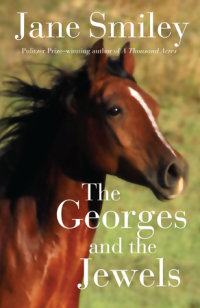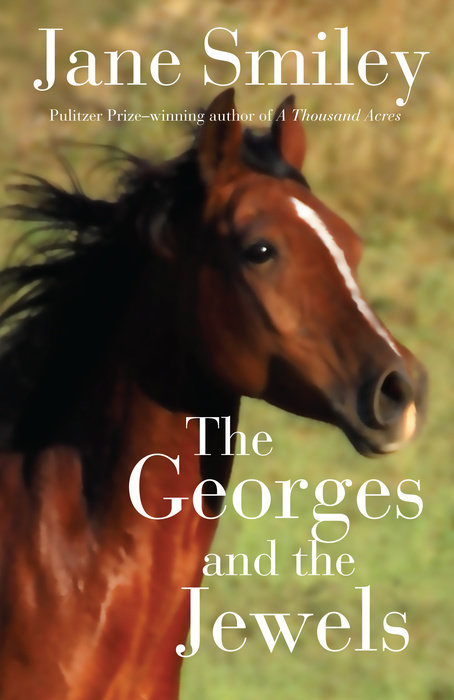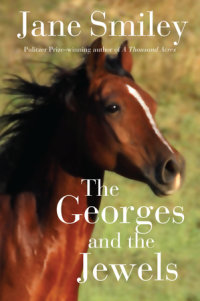Chapter 1
Sometimes when you fall off your horse, you just don't want to get right back on. Let's say he started bucking and you did all the things you knew to do, like pull his head up from between his knees and make him go forward, then use a pulley rein on the left to stop him. Most horses would settle at that point and come down to a walk. Then you could turn him again and trot off--it's always harder for the horse to buck at the trot than at the lope. But if, right when you let up on the reins, your horse put his head between his knees again and took off bucking, kicking higher and higher until he finally dropped you and went tearing off to the other end of the ring, well, you might lie there, as I did, with the wind knocked out of you and think about how nice it would be not to get back on, because that horse is just dedicated to bucking you off.
So I…
Chapter 1
Sometimes when you fall off your horse, you just don't want to get right back on. Let's say he started bucking and you did all the things you knew to do, like pull his head up from between his knees and make him go forward, then use a pulley rein on the left to stop him. Most horses would settle at that point and come down to a walk. Then you could turn him again and trot off--it's always harder for the horse to buck at the trot than at the lope. But if, right when you let up on the reins, your horse put his head between his knees again and took off bucking, kicking higher and higher until he finally dropped you and went tearing off to the other end of the ring, well, you might lie there, as I did, with the wind knocked out of you and think about how nice it would be not to get back on, because that horse is just dedicated to bucking you off.
So I did lie there, looking up at the branches of the oak tree that grew beside the ring, and I did wait for Daddy to come trotting over with that horse by the bridle, and I did stare up at both their faces, the face of that horse flicking his ears back and forth and snorting a little bit, and the face of my father, red-cheeked and blue-eyed, and I did listen to him say, "Abby? You okay, honey? Sure you are. I saw you bounce! Get up, now."
I sighed.
"How am I going to tell those folks who are looking to buy these horses that a little girl can ride them, if you don't get up and ride them?"
I sat up. I said, "I don't know, Daddy." My elbow hurt, but not too badly. Otherwise I was okay.
"Well, then."
I stood up, and he brushed off the back of my jeans. Then he tossed me on the horse again.
Some horses buck you off. Some horses spook you off--they see something scary and drop a shoulder and spin and run away. Some horses stop all of a sudden, and there you are, head over heels and sitting on the ground. I had a horse rear so high once that I just slid down over her tail and landed in the grass easy as you please, watching her run back to the barn. I started riding when I was three. I started training horses for my dad when I was eight. I wasn't the only one--my brother, Danny, was thirteen at the time, and he did most of the riding (Kid's Horse for Sale), but I'm the only one now.
Which is not to say that there aren't good horses and fun horses. I ride plenty of those, too. But they don't last, because Daddy turns those over fast. I had one a year ago, a sweet bay mare. We got her because her owner had died and Daddy picked her up for a song from the bank. I rode her every day, and she never put a foot wrong. Her lope was as easy as flying. One of the days she was with us, I had a twenty-four-hour virus, so when I went out to ride, I tacked her up and took her down to the crick at the bottom of the pasture, out of sight of the house.
I knew Daddy had to go into town and would be gone for the afternoon, so when I got down there, I just took off the saddle and hung it over a tree limb, and the bridle, too, and I lay down in the grass and fell asleep. I knew she would graze, and she did for a while, I suppose. But when I woke up (and feeling much better, thank you), there she was, curled up next to me like a dog, kind of pressed against me but sweet and large and soft. I lay there feeling how warm she was and smelling her fragrance, and I thought, I never heard of this before. I don't know why she did that, but now when Daddy tells me that horses only know two things, the carrot and the stick, and not to fill my head with silly ideas about them, I just remember that mare (she had a star shaped like a triangle and a little snip down by her left nostril). We sold her for a nice piece of change within a month, and I wish I knew where she was.
But Daddy names all the mares Jewel and all the geldings George, and I can hardly remember which was which after a while.
The particular George who bucked me off had a hard mouth. I did the best I could with him for another twenty minutes, but Daddy said that probably he was going to have to get on him himself, which meant that we weren't going to turn this one over fast, because a little girl couldn't ride him yet. Which meant that Daddy was in bad mood for the rest of the day.
We took the George back up to the barn, and while Daddy threw out the hay, I brushed the George off. He didn't mind, but he didn't love it like some of them do. Then I picked out his feet and took him out and put him into one of the big corrals. We didn't keep horses in stalls unless we had to, because Daddy said that they did better outside anyway, and if you kept them in stalls, well, then, you spent your life cleaning stalls rather than riding. Was that what I wanted?
I always said, "No, Daddy," and he ruffled my hair.
In the winter, though, it bothered me to think of them huddled out in the rain, their tails into the wind and their heads down. Of course that was what horses were meant to do, and ours had heavy coats, but I would lie awake when it rained in the night, wishing for it to stop.
It was worse in Oklahoma.
Oklahoma was where we came from, where Daddy and Mom grew up and had Danny, then me. We moved to California in 1957, when I was four and a half. I could barely remember living there, though we went back once or twice a year to see my grandparents and buy some horses. In Oklahoma, there could be real rain, and real snow, and real ice. Daddy had seen a horse slide right down a hill once, just couldn't stop himself, went down like he was on skis and right over the edge of a crick, fell on the ice, and had to be pulled out with a tractor. Couldn't be saved. At least in California we didn't have ice.


